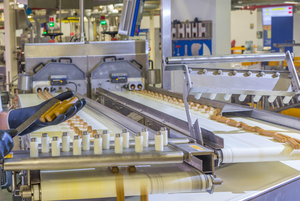Difference between revisions of "Complementary Care and Treats Manufacturing"
Ggaitskell (talk | contribs) |
|||
| (5 intermediate revisions by the same user not shown) | |||
| Line 1: | Line 1: | ||
==Introduction== | ==Introduction== | ||
| − | Treats for cats and dogs come in a variety of forms. In the EU, the majority are termed complementary as they are designed to complement main meal complete and balanced pet foods. In the US, the same products are generally identified as "'''treats'''" or "'''snacks'''". In either case, they should therefore '''only make up a small percentage of the daily calorie intake'''. [[Feeding Guides - Nutrition|Feeding recommendations]] on some pet food manufacturers’ products suggest feeding no more than 10% of required daily calories. | + | [[File:Treats manufacture.png|300px|right|thumb|Treats manufacture using an extruder]] |
| + | Treats for cats and dogs come in a variety of forms. In the EU, the majority are termed "complementary" as they are designed to complement main meal complete and balanced pet foods. In the US, the same products are generally identified as "'''treats'''" or "'''snacks'''". In either case, they should therefore '''only make up a small percentage of the daily calorie intake'''. [[Feeding Guides - Nutrition|Feeding recommendations]] on some pet food manufacturers’ products suggest feeding no more than 10% of required daily calories. | ||
Here are some of the most common ways to make treats for cats and dogs: | Here are some of the most common ways to make treats for cats and dogs: | ||
| − | + | == Extrusion == | |
| − | This method involves mixing ingredients to form a dough that is pumped into an extruder. The dough may be a combination of meat and animal derivatives and dry ingredients such as wheat flour or potato starch that when extruded produce strip like treats. Alternatively, ingredients may be based on rice flour and wheat starch that when combined provide a chewy, spongy texture ideal for products that help clean teeth. | + | This method involves mixing ingredients to form a dough that is pumped into an [[Dry Pet Food Manufacturing#Cooking and Cooling|extruder]]. The dough may be a combination of meat and animal derivatives and dry ingredients such as wheat flour or potato starch that when extruded produce strip like treats. Alternatively, ingredients may be based on rice flour and wheat starch that when combined provide a chewy, spongy texture ideal for products that help clean teeth. |
| − | + | == Biscuit Baking == | |
The primary ingredient in this process is usually wheat flour. Wheat flour is combined with [[Vitamins - Nutrition|vitamins]], flavours, [[Water - Nutrition|water]] and preservatives to make a soft dough. The dough is then cut into the required shapes and sizes before baking in an oven. | The primary ingredient in this process is usually wheat flour. Wheat flour is combined with [[Vitamins - Nutrition|vitamins]], flavours, [[Water - Nutrition|water]] and preservatives to make a soft dough. The dough is then cut into the required shapes and sizes before baking in an oven. | ||
| − | + | == Injection Moulding == | |
Here ingredients are mixed together before being injected into a shaped mould. After cooling the treats are released from the mould. Moulds are usually used to create specific sizes and shapes of chew. | Here ingredients are mixed together before being injected into a shaped mould. After cooling the treats are released from the mould. Moulds are usually used to create specific sizes and shapes of chew. | ||
| Line 23: | Line 24: | ||
|date = April 2017 | |date = April 2017 | ||
}} | }} | ||
| + | {{Mars Petcare}} | ||
| + | {{OpenPages}} | ||
[[Category:Pet Food Manufacture]] | [[Category:Pet Food Manufacture]] | ||
[[Category:To Do - Nutrition]] | [[Category:To Do - Nutrition]] | ||
Latest revision as of 09:55, 10 July 2017
Introduction
Treats for cats and dogs come in a variety of forms. In the EU, the majority are termed "complementary" as they are designed to complement main meal complete and balanced pet foods. In the US, the same products are generally identified as "treats" or "snacks". In either case, they should therefore only make up a small percentage of the daily calorie intake. Feeding recommendations on some pet food manufacturers’ products suggest feeding no more than 10% of required daily calories.
Here are some of the most common ways to make treats for cats and dogs:
Extrusion
This method involves mixing ingredients to form a dough that is pumped into an extruder. The dough may be a combination of meat and animal derivatives and dry ingredients such as wheat flour or potato starch that when extruded produce strip like treats. Alternatively, ingredients may be based on rice flour and wheat starch that when combined provide a chewy, spongy texture ideal for products that help clean teeth.
Biscuit Baking
The primary ingredient in this process is usually wheat flour. Wheat flour is combined with vitamins, flavours, water and preservatives to make a soft dough. The dough is then cut into the required shapes and sizes before baking in an oven.
Injection Moulding
Here ingredients are mixed together before being injected into a shaped mould. After cooling the treats are released from the mould. Moulds are usually used to create specific sizes and shapes of chew.
| This article was: Date reviewed: April 2017 |
| Endorsed by Mars Petcare, the world’s leading pet nutrition and health care business that strives to make A Better World for Pets every day. | 
|
Error in widget FBRecommend: unable to write file /var/www/wikivet.net/extensions/Widgets/compiled_templates/wrt69a17adec82b71_38444538 Error in widget google+: unable to write file /var/www/wikivet.net/extensions/Widgets/compiled_templates/wrt69a17aded04420_52888073 Error in widget TwitterTweet: unable to write file /var/www/wikivet.net/extensions/Widgets/compiled_templates/wrt69a17aded58a31_75508258
|
| WikiVet® Introduction - Help WikiVet - Report a Problem |
